This is an essay based on an introductory talk Kirk gave at A Place at the Table: Creativity in Food and Togetherness on January 18th 2013. This has been edited from the audio version (which will be made available as soon as it has been properly prepared for posting).
I remember in the days following 9/11 when I lived in Manhattan there was a desire to seek out some level of personal and communal healing. The arts group I was a part of sought that out in Tribeca—a half a dozen blocks from Ground Zero. We began to meet weekly in a bakery behind Robert De Niro’s “Tribeca Grill” called the “Tribakery”—we named our group “The Tribakery Group” in honor of that place. We met there for many reasons. One, was for communal healing through friendship and conversation. Two, was to stir our creative juices together as artists, and three we wanted to bring our meager “art income” earnings down to one of the neighborhoods hit hard economically after the attack. That being said, the unstated but very evident reason we met at Tribakery was the great baked goods and variety of strong coffees that we would consume every week. We knew the food and drink would be good because they resourced Mr. De Niro’s grill right next door. I was never disappointed…they had great coffee and croissants. These seemingly minor starches and hot liquids sped our healing, enhanced the creative juices, and satisfied the investment of our monies.
This same group influenced a few visiting college students who later started the Friday Arts Project (FAP) at Winthrop University in Rock Hill, South Carolina. In fact, some of FAP’s earliest gatherings were held at a bagel place not far from Winthrop. These meetings continued even after graduation and meals became a centerpiece of many sponsored events.
Perhaps it is because food is a visible and physically evident manifestation of a mysterious blessing. We can see and feel the food we prepare and eat, we can smell its aromas that cause our mouths to water.
We can touch the hand of a friend, kiss the lips of a lover, hear the audible utterances of an intimate conversation.So why is food such a prevalent ingredient in social gatherings? Why does it seem so closely connected to creativity in these artists’ communities—both in Rock Hill and NYC? How does this combination of creativity, food, and relationships reflect Goodness, one of the “transcendentals”—Truth, Beauty and Goodness?
But is that all food and relationship is? What about my commitment to my lover and my wife Sarah? Are my feelings and bodily responses both emotionally and sensually to my wife the mere movement of hormones and electrical pulses through my veins and nervous system? Are the salivary responses of my mouth to a good slice of pizza only that—saliva in my mouth and nothing else? Or perhaps is there more going on?
I wish to assert with humble inquiry that perhaps our culture is suffering from the downside of modern philosophy. To be fair, I am grateful for the science of food. In the last year I have lost weight mainly by engaging in some of the science of food in relation to my body. I’ve measured my caloric intake, and attempted to balance the amount of proteins, carbohydrates and minerals my body consumes. The result? I’ve shed some pounds. But is that all it is?
In thinking about this I was reminded of an episode in the third season of Star Trek: The Next Generation. Captain Picard was kidnapped by telepathic dimensional beings who placed him in a room with three other humanoids. The only source of food was in a tube in the middle of the room that dispensed what looked to be green jello discs. I believe this is ultimately how most of our modern society views food. Simply as a resource we are to consume as needed when our bodies are lacking the fuel to function.
Although to a degree true, I find this view incomplete and hollow. In his introduction to “The Hungry Ear: Poems of Food & Drink” Professor Kevin Young writes this:
Love, satisfaction, trouble, death, pleasure, work, sex, memory, celebration, hunger, desire, love, laughter, even salvation: to all these things food can provide a prelude; or comfort after; and sometimes a handy substitute for. It often seems food is a metaphor for most anything, from justice to joy.[1]
I believe food, in context, is a powerful vehicle to reveal the True and Beautiful…which is why it is a Good in itself. In Ecclesiastes it is written, “A feast is made for laughter, wine makes life merry.”
We need to invite imagination back into the reality of food and fellowship. This is an uncomfortable thing for many in our society because it verges on the border of mystery, faith, even just plain wackiness. The Cambridge University priest, Malcolm Guite addresses a similar dilemma in his book Faith, Hope and Poetry: Theology and the Poetic Imagination. In his book he makes the case that poetry is a viable form of communicating truth. He says it is “truth bearing”. He writes: “…we can ‘credit poetry’, trust its tacit, intuitive and image-laden way of knowledge.”[2]
Is this not similar to Prof Young’s metaphor language in his thoughts on food? I am asking and positing this same idea about food and fellowship, it is truth-bearing, it is important—at times even sacred. Wendell Berry describes the acts of growing and eating food using similar language. In his essay “The Pleasures of Eating” he writes:
Eating with the fullest pleasure…is perhaps the profoundest enactment of our connection with the world. In this pleasure we experience and celebrate our dependence and our gratitude, for we are living from mystery, from creatures we did not make and powers we cannot comprehend.[3]
During the opening scene from the 1992 version of “Last of the Mohicans”, Hawkeye, Uncas, and Chingochkoock are hunting an elk. After Hawkeye kills the elk, Chingochkock approaches the body and says a prayer over the beast. The moment is almost reverent…the way we should approach our food much of the time.
But looking at food and relationship with imagination in our eyes doesn’t answer all our questions…and that’s ok. Prof Young says as much this when he writes: “…sometimes food is just food.” Honestly, I am critiquing some of modern ideas but if all I had were green jello disks to eat because they was nothing else, then the disks would be pulled pork for me…that is until I was able to actually get pulled pork.
The things we understand should be respected, but we must also remember and respect the things we don’t understand. Father Guite proposes that “…truth-bearing language does not have to be purged of ambiguity in order to be truthful…”[4] Even Science needs unanswered questions to keep it fueled with life. There is a difference between a complete answer and a satisfying answer…this is why we have poets and artists…to help us recognize the obscure edges of what we do know. Wendell Berry in his poem “The Clearing” writes, “Vision must have severity at its edge…”[5] I think we can say the same about food and friendship.
I always appreciated the scene of the first appearance of a dementor in the Harry Potter movies. After Professor Lupin repels the demon-like creature with the Potronus spell, he hands Harry something and says “Here, eat this, you’ll feel better.” It was a piece of chocolate. Ever after that chocolate was on hand to eat after a dementor’s presence was felt. I think Rowling’s insight here is mysterious and profound, she understands the connection between food and morale…”Here, eat this, you’ll feel better.”
Father Guite refers to this implication when he writes: “..symbols are energised between the two poles of immanence and transcendence.”[6]
This concept is evident in a right understanding of Beauty. The source of Beauty must be both immanent—here and now, and transcendent—above and beyond, in order to be credible and the true source of Beauty. By applying Malcolm Guite’s observation to Goodness—as in the expression of Food and Fellowship—Goodness is both immanent and transcendent. This is why we need to discuss it, paint it, write about it…and even eat it. Food IS starches, proteins, etc and yet it is MORE than that. Relationship IS words of encouragement from a friend and yet it is MORE than that.
I hope you can see from the few ideas I have shared the unique relationship between food and human relations. If you don’t, then have patience, perhaps it will come in the course of a good meal or an intimate conversation with a good friend.
A poem by Joy Harjo summarizes (in a mysterious way) what I am arguing here, it is called “Perhaps the World Ends Here”.
Perhaps the World Ends Here
The world begins at a kitchen table. No matter what, we must eat
to live.
The gifts of earth are brought and prepared, set on the table. So it has
been since creation, and it will go on.
We chase chickens or dogs away from it. Babies teethe at its corners.
They scrape their knees under it.
It is here that children are given instructions on what it means to be
human. We make men at it, we make women.
At this table we gossip, recall enemies and the ghosts of lovers.
Our dreams drink coffee with us as they put their arms around our
children. They laugh with us at our poor falling-down selves
and as we put ourselves back together once again at the table.
This table has been a house in the rain, an umbrella in the sun.
Wars have begun and ended at this table. It is a place to hide in the
shadow of terror. A place to celebrate the terrible victory.
We have given birth on this table, and have prepared our parents for
burial here.
At this table we sing with joy, with sorrow. We pray of suffering and
remorse. We give thanks.
Perhaps the world will end at the kitchen table, while we are laughing
and crying, eating of the last sweet bite.[7]
[1] Kevin Young, The Hungry Ear: Poems of Food and Drink, 2012
[2] Malcolm Guite, Faith, Hope and Poetry: Theology and the Poetic Imagination, 2012
[3] Wendell Berry, accessed at http://www.ecoliteracy.org/essays/pleasures-eating on 01-2013
[4] Guite, Faith, Hope and Poetry.
[5] Wendell Berry, Collected Poems: 1957-1982, 1984
[6] Guite, Faith, Hope and Poetry.
[7] Kevin Young, The Hungry Ear.
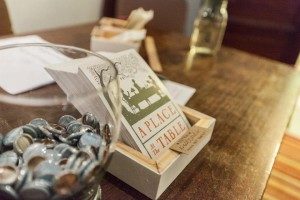
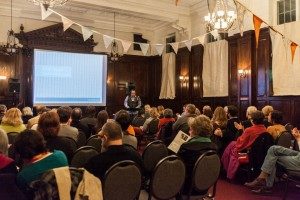
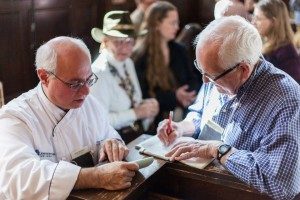


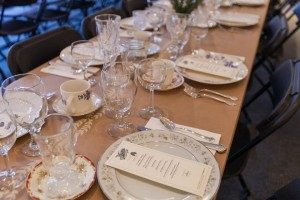
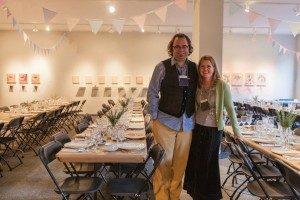
This conversation on immanence and transcendence reminds me of my dear late husband, Mike. He was very intellectual and loved these kinds of words. He started his day by having words like this for breakfast.
I, on the other hand, make sure I have a dictionary on hand for occasions such as this. But I’m learning and growing not only as I enjoy a good picnic, but also as I read and comprehend such words.
Thanks, Kirk, for teaching me.
Thank you Kathy. I am glad to hear that Mike would have been charged up by my meager words. I hope we can see you soon. K